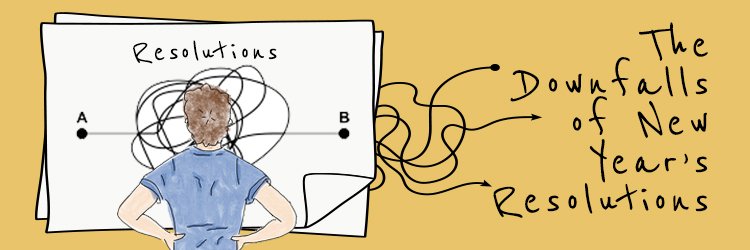[vc_row][vc_column][vc_column_text]As the new year approaches, there will be tons of articles circulating about making New Year’s resolutions. Products will offer quick fixes for how you can lose 20 pounds in two months, improve your emotional health in an instant, etc. There can be a lot of pressure to make immediate changes. This is stressful, and not conducive to how humans work. The past few years, I’ve been reframing the way I approach this. Instead of calling them resolutions, I call them goals. Even the definition of “goal” vs that of “resolution” makes goals sound more accessible. One of the first definitions of “resolution” is “the act of resolving or determining upon an action.” On the other hand, the first definition of “goal” is “the end toward which effort is directed.” “Resolution” connotes something already complete—“goal” is the act of working towards.  [/vc_column_text][/vc_column][/vc_row][vc_row][vc_column][vc_column_text]It’s a seemingly small change, but words affect how we see things. The word “goal” doesn’t have the same type of pressure. And setting goals is slower; you can go in increments. If it’s a larger goal, I break it up into smaller ones. For instance, let’s say I wanted to learn a new language. Maybe I’d make it my first task to do research: what are some books I could read, shows I could watch, people I know who might want to speak that language with me. Once I’m done with that phase, I might make a goal for how many words or sentences I’ll learn per week or month. This makes it feel doable—in turn making me more likely to do it. In their (as I’ve noticed) widely quoted article Toward a Theory of Task Motivation, Dr. Gary Latham and Dr. Edwin Locke wrote that more than 90% of the time, people performed better with specific and reasonably challenging goals. Another widely talked about method, also sometimes used in addiction interventions, is SMART; SMART stands for Specific, Measurable, Achievable, Realistic, and Timely.
[/vc_column_text][/vc_column][/vc_row][vc_row][vc_column][vc_column_text]It’s a seemingly small change, but words affect how we see things. The word “goal” doesn’t have the same type of pressure. And setting goals is slower; you can go in increments. If it’s a larger goal, I break it up into smaller ones. For instance, let’s say I wanted to learn a new language. Maybe I’d make it my first task to do research: what are some books I could read, shows I could watch, people I know who might want to speak that language with me. Once I’m done with that phase, I might make a goal for how many words or sentences I’ll learn per week or month. This makes it feel doable—in turn making me more likely to do it. In their (as I’ve noticed) widely quoted article Toward a Theory of Task Motivation, Dr. Gary Latham and Dr. Edwin Locke wrote that more than 90% of the time, people performed better with specific and reasonably challenging goals. Another widely talked about method, also sometimes used in addiction interventions, is SMART; SMART stands for Specific, Measurable, Achievable, Realistic, and Timely. 








